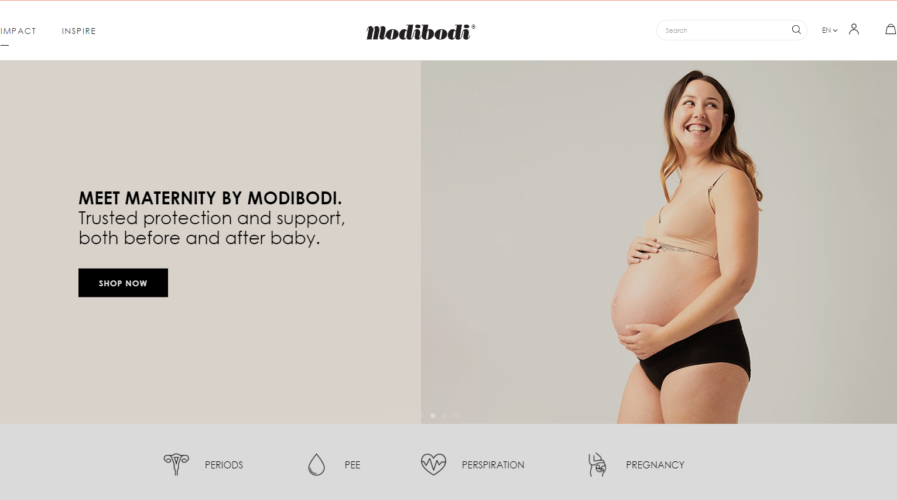
A screenshot of Australian Femtech e-Commerce site, Modibodi. Modibodi develops and sells period and leak-proof apparel for people who not just menstruate, but who also give birth, or have incontinence issues.
Here are seven Femtech companies from the Asia Pacific
Ladies first. Women’s health and wellness are the priority in female technology. From software and apps to devices and drugs, femtech is designed to improve women’s quality of life in mind. An industry report said the femtech market is valued at $18.7 billion in 2019 and will rise to $60 billion by 2027.
It divided the market into 14 subsectors according to applications: pregnancy, longevity, sexual healthcare, beauty for femtech, diagnostics, women’s education, fitness, healthy lifestyle, fertility, women’s cancers treatment, period, nursing, mental health, and pharm tech.
The FemTech Analytics report focused on 1,550 femtech companies around the world. In 2021, North America accounted for 51.9% of the companies, followed by Europe at 23.5% and Asia at 13.9%. Australia has 4.7% of the regional distribution, with South America at 4.4% and Africa the least at 1.6%.
No, investors, Femtech is not “niche”
So with the industry expected to grow, why aren’t they heard or seen more often?
Society’s systemic sexualization and discomfort are at the root of its invisibility. For example, non-profit organization FemTech Focus and venture capital fund Coyote Ventures reported that male investors frequently perceive femtech as a niche market. The 2021 white paper highlighted that this was due to the social stigma against women’s bodies; therefore, the male counterparts have often never heard about the issues the founders describe.
More than 80% of femtech startups have a female founder, it said. However, getting funding from investors, who are 95% male, is already challenging for female founders before adding women’s health products into the equation.
“Often, advertisements on social media, television, and Google are blocked for being allegedly inappropriate. This censorship not only affects sexual wellness products, but most women’s health, including urinary health, fertility, breastfeeding, and maternal health products,” the paper said.
“The insult to injury is that men’s health ads that use words such as erectile dysfunctional, semen and ejaculation are often accepted.”
Let’s talk Femtech in APAC and their founders
Increasing awareness of femtech products and services is essential to increase its visibility to investors and, more importantly, its intended users.
Here’s a snapshot of female-led femtech companies in the Asia-Pacific region to start your exploration.
1. Modibodi – Founder and CEO Kristy Chong, Australia
Modibodi is the pioneer in period and leak-proof apparel with its patented Modifier Technology™. Its reusable and sustainable range has since expanded from period underwear to maternity, activewear, and swimwear, leak-proof against period, sweat, pee, and incontinence. It even has 24-hour absorbency underwear and reusable diapers.
2. Maya – Founder and CEO Ivy Huq Russell, Bangladesh
Maya is a mobile app that provides health and mental well-being assistance by connecting users to medical information and experts. It uses natural language processing and machine learning technology to handle basic queries in Bengali and regional dialects and routing users to human experts when their situation calls for it.
3. Niramai – Founder and CEO Dr Geetha Manjunath, India
Niramai is short for “Non-Invasive Risk Assessment with Machine Intelligence.” Its proprietary Thermalytix technology uses AI and high-resolution thermal imaging in its low-cost, accurate, portable breast cancer screening and fever test devices. In addition, it is currently working on a full-body screening device that can detect various diseases.
4. Sehati – Founder Anda Waluyo, Indonesia
Sehati or Sehat Indonesia aims for just that – a healthy Indonesia, but focusing on maternal healthcare to assist midwives and give information to expecting mothers. This is available through its integrated solution from mobile apps to its TeleCTG portable fetal well-being monitoring device with IoMT (internet of medical things) technology.
5. EloCare – Co-founder Mabel Yen Ngoc Nguyen, Singapore
EloCare has a wearable device and a mobile app based on IoMT technology for optimized chronic and aging care. It monitors symptoms of menopause, and the user’s body data can be recorded and interpreted, so the user can better understand and have an insight into her health condition to improve her lifestyle and medical choices.
6. Blushh – Co-founders Soyeon Hwang, Ja Young Choi, SJ Choi, Sunny Kim, and Yon Soo Park, South Korea
Blushh is an app that brings sensual stories and romantic voices to your ears. Its monthly subscription includes sexy and immersive audio and articles with tips and guides to inspire and empower sexual wellness for women in Asia.
7. ZaZaZu – Founder Jingjin Liu, Singapore
ZaZaZu is the first personalized sexual wellness hub in the Asia Pacific for women. In a recent interview with Study International, Liu explained that the ZaZaZu platform synergizes education, digital services, and products to aid women in attaining agency over their sexual health. In addition, the platform seeks to empower women with the information and tools for a healthy sexual life.
READ MORE
- Ethical AI: The renewed importance of safeguarding data and customer privacy in Generative AI applications
- How Japan balances AI-driven opportunities with cybersecurity needs
- Deploying SASE: Benchmarking your approach
- Insurance everywhere all at once: the digital transformation of the APAC insurance industry
- Google parent Alphabet eyes HubSpot: A potential acquisition shaping the future of CRM




